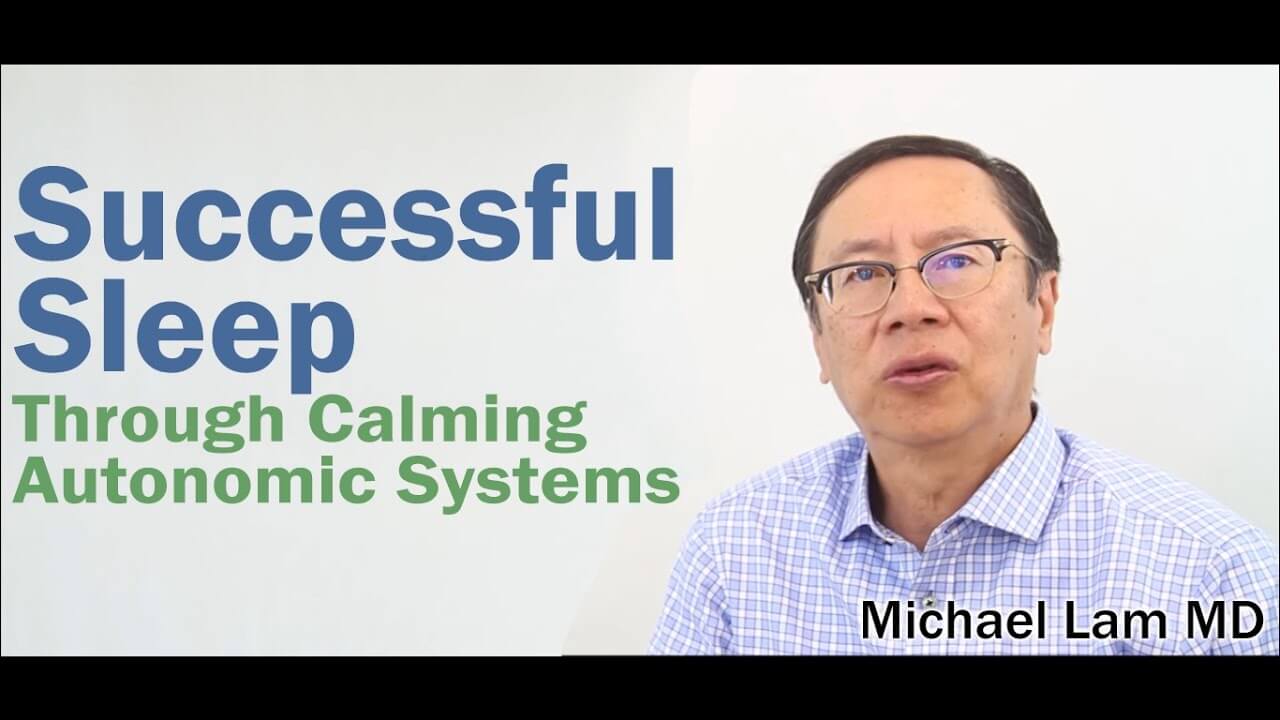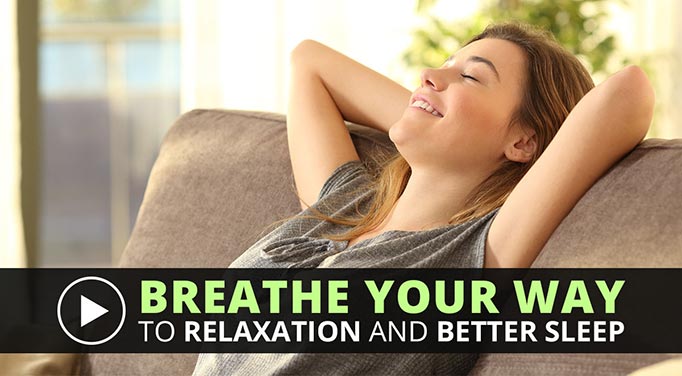
 When you sleep, your body has autonomic functions that keep your organs going, your blood flowing, your rhythms maintained and keep your breathing regulated and active. However, some of these body functions are not just autonomic. You can also control them. Breathing is one such example. For instance, when you are awake you can control your breathing. As an example, you can stop your breathing for 20 seconds at will or you can take a deep breath or exhale whenever you like. However, most of the time we pay little attention to our breathing and that is why it is autonomic, as well as voluntary. Now look at your heart, you can’t tell your heart to stop at will, or pump faster by just thinking it, this is because it is fully autonomic. So, it is safe to say that relaxing breathing is essential but it is also a great tool for relaxing because it is one organ you can actually “train.”
When you sleep, your body has autonomic functions that keep your organs going, your blood flowing, your rhythms maintained and keep your breathing regulated and active. However, some of these body functions are not just autonomic. You can also control them. Breathing is one such example. For instance, when you are awake you can control your breathing. As an example, you can stop your breathing for 20 seconds at will or you can take a deep breath or exhale whenever you like. However, most of the time we pay little attention to our breathing and that is why it is autonomic, as well as voluntary. Now look at your heart, you can’t tell your heart to stop at will, or pump faster by just thinking it, this is because it is fully autonomic. So, it is safe to say that relaxing breathing is essential but it is also a great tool for relaxing because it is one organ you can actually “train.”
How do breathing and autonomic systems all support successful sleep? Relaxing sleep breathing has two main functions: relaxation and the functional part that keeps you alive by sucking in air and exhaling automatically. Both of these functions have to be in unison. If one of these functions is not working you may have sleep apnea, frequent waking, crazy dreams or even choking episodes. So, you see both of these breathing functions are vital for successful sleep. Learning how to breathe better can be relaxing, as well as, a great bridge to the autonomic nervous system. Overall it can promote better sleep conditions and help you to achieve optimal health.
There are many ways that deep breathing, relaxing breathing and forms of meditation can actually help promote a better night's sleep. Some people practice mindful breathing. Mindful breathing can reduce stress, aid in anxiety disorders and digestive disorders. It is also very calming and can be energizing. Yoga can also teach valid breathing techniques that aid in relaxation and can promote sleep. However, what we really are talking about is breathing for relaxation. This type of breathing involves learning how to breathe abdominally or diaphragmatic breathing. Newborn babies and even sleeping adults display this type of breathing. Relaxing breathing is where you inhale air into your lungs and exhale as your diaphragm contracts. This type of breathing isn’t forced and is evenly consistent in cycles. It’s a way to regulate your breathing and promote relaxation.
In order to achieve this breathing on your own you have to be aware of your breathing patterns and shift them more to abdominal breathing. In doing so, you will reduce anxiety, muscle tension and actually become more relaxed. In order for this to become a successful habit it has to be practiced time and time again until it becomes like second nature to you. It is rather easy to learn but it is the consistency that pays off.

You should practice this for several minutes 4 to 5 times a day. Eventually breathing through your abdomen will come naturally. You don’t need to feel unhinged, tired, or anxious before trying this breathing technique out. Practice makes perfect. So it is okay to practice even if you don’t have an issues at the moment.
Regulating the rate of your breathing and where in the body the breathing comes from forms a sense of relaxation in the body and is much like the autonomic breathing you have while you are sleeping. People also said it may work because it’s a lot like mindful breathing, where you are quieting your thoughts and listening to yourself. To just breathe, alone, brings you to a relaxing place and can induce a sense of sleepiness.
Insomnia or frequently waking up at night is a risk factor for so many things including weight gain and diabetes type 2. It also can increase hormone levels related to stress, raise blood pressure and even affect cognitive function and/or cause brain fog. This is why relaxing breathing can help destress you, clear your mind and help you get some good rest.
If you have any type of breathing problems, oxygen problems, or any other health concerns please consult your primary care physician before attempting any breathing relaxation techniques. Your health is very important and you should not try this without consulting a doctor if there is a more serious underlying problem at hand.
Also, if you suffer from Adrenal Fatigue Syndrome please read further to understand the pros and cons of relaxing breathing, affects they may have on your body. You can never be too careful these days. Knowing the facts can help you live a much healthier life.
Adrenal fatigue syndrome happens when your adrenal glands become tired. Adrenal fatigue syndrome is caused by stress or factors that take a toll on the adrenal glands and make it hard for them to put out adequate amounts of cortisol. There are many signs and symptoms of AFS including: depression, trouble sleeping, lack of energy, need for caffeine or other stimulants in the morning, resisting going to bed, not wanting to get out of bed, cravings for salty foods and other similar ailments. The best way to remedy this condition is reducing stress. You can’t eliminate all stressors, but by eliminating the physical ones, causing the biggest issues, you will be on the right path to helping your adrenal glands.
 Sleep disorders and sleep breathing problems are relevant in those who suffer from adrenal fatigue.These are common because the hormone cortisol, and other stress related hormones, keep harmony between the adrenals and sleep. If they are deregulated it will keep the body alert. It often leads to waking up in the middle of the night or poor sleep quality. Lack of sleep has a negative impact on the body increasing irritability. It disturbs mental function and can trigger things like hypoglycemia and metabolic imbalances.
Sleep disorders and sleep breathing problems are relevant in those who suffer from adrenal fatigue.These are common because the hormone cortisol, and other stress related hormones, keep harmony between the adrenals and sleep. If they are deregulated it will keep the body alert. It often leads to waking up in the middle of the night or poor sleep quality. Lack of sleep has a negative impact on the body increasing irritability. It disturbs mental function and can trigger things like hypoglycemia and metabolic imbalances.
Often people turn to sleep aids to help. These are not always effective and often times can cause problems in people with certain conventional medical conditions. Using sleep aids with conditions like adrenal fatigue can have adverse affects on your overall health. A better concept is breathing for relaxation. Just like autonomous breathing can help during sleep, relaxing breathing can help you sleep. If you use sleep aids it can overload your body and cause other problems such as liver congestion, leading to concerns like anxiety, fatigue, heart palpitations and even brain fog. Some cases may even bring on adrenal exhaustion or adrenal crashes. Always be sure to talk to your specialist about your sleep problems before trying a self-remedy.
Overall, in order to alleviate some of the sleep issues that come with adrenal fatigue you must get into a good breathing rhythm. It is one of the best ways to relax your body. Adrenal breathing helps to activate the parasympathetic nervous system. In doing so, your body relaxes and calms down. I recommend trying it every night and seeing if you get better sleep at night. Be careful if you are in the advanced stages of adrenal fatigue. Breathing in too deep can be stimulating on the body and may lead to increased feelings of anxiety instead of decreasing it. It is best to start off lightly and slowly. If this does not help then talk to a physician or a specialist that can help you determine your underlying sleep issues. As stated earlier, lack of sleep can lead to big health problems. So it is important to determine the underlying issues.
The NeuroEndoMetabolic (NEM) Stress Response systems show how the body correlates and reacts to different stressors and factors within the body. This is a conventional model that explains how the neuroendocrine system manages and reacts to stress. One of the highways of the neuroendocrine system is the hypothalamic-pituitary-adrenal (HPA) hormonal axis. Among this axis is the adrenal glands that aid in checks and balances of keeping stress in check. When a body receives a stressor the adrenals produce cortisol. Cortisol, helps us maintain stress. If the adrenal glands are overloaded, adrenal fatigue occurs. With it comes symptoms like sleep disruption. The NEM stress response shows how one area of the body affects another. Lack of sleep affects brain function, digestive function, mood, and can cause increases in blood pressure.
Doing relaxing exercises for breathing, adrenal breathing exercises, may clear your head, normalize your body and put you into the most relaxed state, promoting successful sleep. This is why breathing correctly and regulating it is crucial. It’s crucial in individuals who may have adrenal fatigue syndrome.
 During the day your cortisol levels ebb and flow, peaking and then dropping. However, your body may produce cortisol at night and throw your whole body out of whack. This could be the reason why you have trouble going to bed at night or insomnia. As stated earlier, some people will try sleep aids to remedy this. However, with higher than normal levels of cortisol at night, it can have a paradoxical effect on your body. Overall, the safest route to go is to learn to breathe in a relaxing way that won’t add unnecessary chemicals into your body. If you have any concerns you should always talk to a professional. You might think that you know how to handle things, but a professional can often shed a more knowledgable light on it. Also, if you have adrenal fatigue syndrome please talk to someone who is well versed in adrenal fatigue syndrome, so that you can get proper answers to your sleep problems and help remedy the situation.
During the day your cortisol levels ebb and flow, peaking and then dropping. However, your body may produce cortisol at night and throw your whole body out of whack. This could be the reason why you have trouble going to bed at night or insomnia. As stated earlier, some people will try sleep aids to remedy this. However, with higher than normal levels of cortisol at night, it can have a paradoxical effect on your body. Overall, the safest route to go is to learn to breathe in a relaxing way that won’t add unnecessary chemicals into your body. If you have any concerns you should always talk to a professional. You might think that you know how to handle things, but a professional can often shed a more knowledgable light on it. Also, if you have adrenal fatigue syndrome please talk to someone who is well versed in adrenal fatigue syndrome, so that you can get proper answers to your sleep problems and help remedy the situation.
Various breathing techniques can have a calming affect on your body and even help promote sleep. However, the best type of breathing, for aiding sleep, is relaxing breathing otherwise known as abdominal breathing. This type of breathing, in unison with autonomic breathing, will promote sleep and help you to maintain optimal health. Overall, this type of breathing is also a good way to remedy sleep disorders when you suffer with conditions like adrenal fatigue syndrome. Be sure to talk to a specialist before undergoing any type of relaxing breathing, especially if you suffer from breathing conditions or diseases. Also, keep in mind that sleep aids can have bad results on someone who already has a compromised hormonal condition or adrenal fatigue syndrome. It is best to understand all the facts before trying to do anything yourself. That’s why it is always important to talk to a valid and licensed professional.
© Copyright 2017 Michael Lam, M.D. All Rights Reserved.

